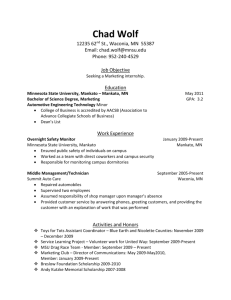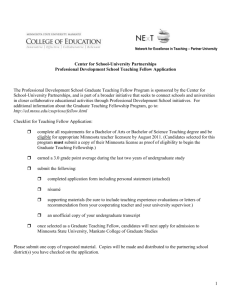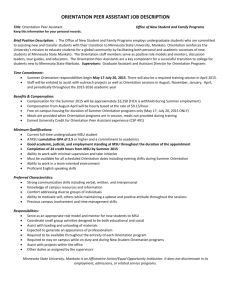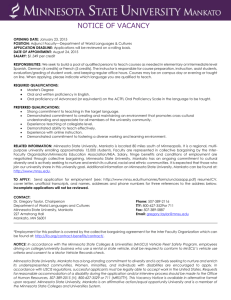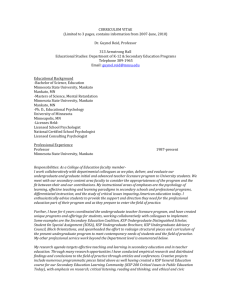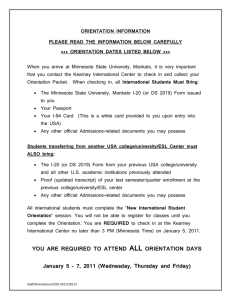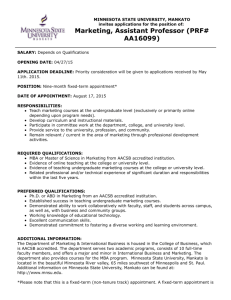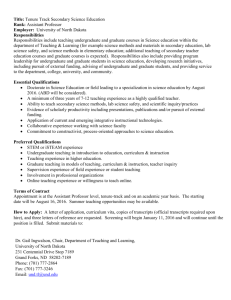Biological Sciences Possible Alumni Success Story Questions We
advertisement
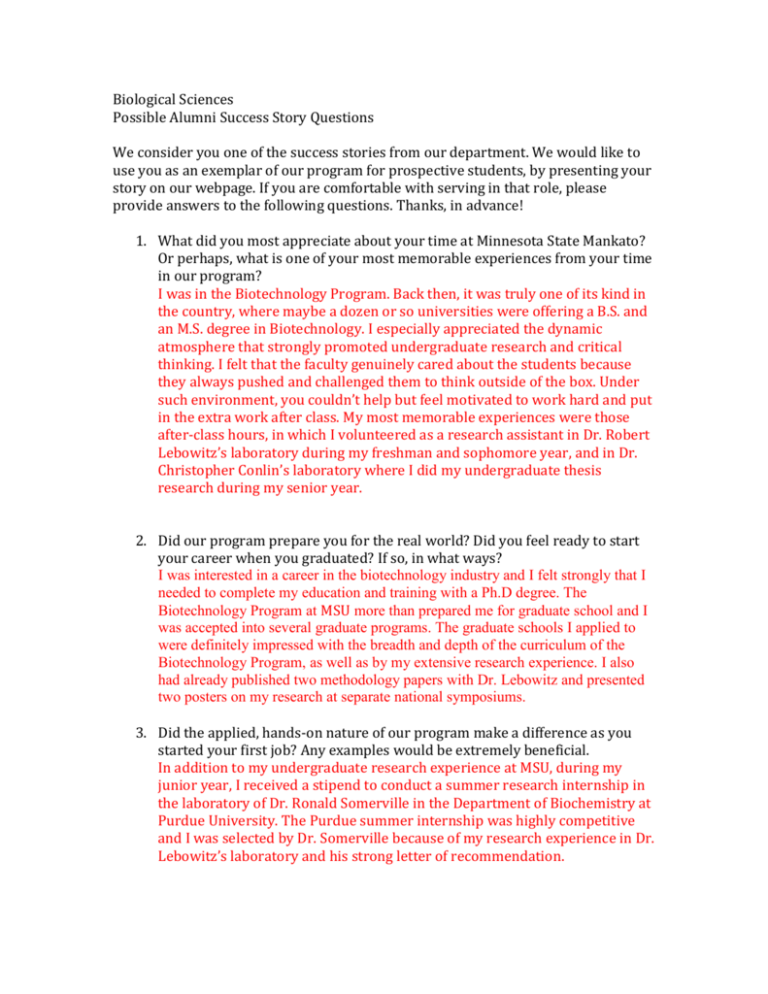
Biological Sciences Possible Alumni Success Story Questions We consider you one of the success stories from our department. We would like to use you as an exemplar of our program for prospective students, by presenting your story on our webpage. If you are comfortable with serving in that role, please provide answers to the following questions. Thanks, in advance! 1. What did you most appreciate about your time at Minnesota State Mankato? Or perhaps, what is one of your most memorable experiences from your time in our program? I was in the Biotechnology Program. Back then, it was truly one of its kind in the country, where maybe a dozen or so universities were offering a B.S. and an M.S. degree in Biotechnology. I especially appreciated the dynamic atmosphere that strongly promoted undergraduate research and critical thinking. I felt that the faculty genuinely cared about the students because they always pushed and challenged them to think outside of the box. Under such environment, you couldn’t help but feel motivated to work hard and put in the extra work after class. My most memorable experiences were those after-class hours, in which I volunteered as a research assistant in Dr. Robert Lebowitz’s laboratory during my freshman and sophomore year, and in Dr. Christopher Conlin’s laboratory where I did my undergraduate thesis research during my senior year. 2. Did our program prepare you for the real world? Did you feel ready to start your career when you graduated? If so, in what ways? I was interested in a career in the biotechnology industry and I felt strongly that I needed to complete my education and training with a Ph.D degree. The Biotechnology Program at MSU more than prepared me for graduate school and I was accepted into several graduate programs. The graduate schools I applied to were definitely impressed with the breadth and depth of the curriculum of the Biotechnology Program, as well as by my extensive research experience. I also had already published two methodology papers with Dr. Lebowitz and presented two posters on my research at separate national symposiums. 3. Did the applied, hands-on nature of our program make a difference as you started your first job? Any examples would be extremely beneficial. In addition to my undergraduate research experience at MSU, during my junior year, I received a stipend to conduct a summer research internship in the laboratory of Dr. Ronald Somerville in the Department of Biochemistry at Purdue University. The Purdue summer internship was highly competitive and I was selected by Dr. Somerville because of my research experience in Dr. Lebowitz’s laboratory and his strong letter of recommendation. 4. Were you engaged in undergraduate research, any of the department clubs, and/or honor societies? If so, which ones and how did they influence your time at Minnesota State Mankato. I will skip these questions since they are somewhat redundant or I have partially answered them (see above responses) 5. What makes Minnesota State Mankato’s Biological Sciences graduates stand out from others? I have to say that I thought the Biotechnology program was ahead of its time. Spearheaded by Dr. Gregg Marg, now the Chair of the Department of Biological Sciences, the Program was truly innovative in that the award of the B.S. or M.S. degree was contingent on the successful completion of an undergraduate thesis project under the close tutelage of your chosen faculty member. I think MSU’s Biological Sciences graduates stand out not only because they are well-equipped with the fundamentals, but they also develop an appreciation and respect for the practical applications of science. 6. To complete this process, please include a short narrative of training/schools/employment you attended after you left MSU and a photo that shows you doing what you feel you do best. After graduation from MSU, Thomas joined the graduate program of the Department of Microbiology at the University of Washington School of Medicine, where he received his Ph.D. He is currently a Director and the Head of Cellular and Translational Immunology at the EMD Serono Research and Development Institute in MA. He is interested in advancing mechanistic understanding and thus proof of confidence of novel therapeutic agents for the treatment of autoimmune disease. Prior to joining EMD, Thomas has led crossfunctional teams in both large and small molecule drug discovery programs at Eli Lilly and Company, Amgen and Roche. Send to: Minnesota State University, Mankato Department of Biological Sciences TS-242 Trafton Science Center South Mankato, MN 56001 507-389-2786 Administrative Assistant: kate.voight@mnsu.edu
